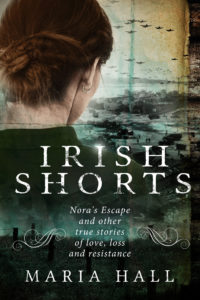Irish Shorts:
Nora’s Escape and other true stories of love, loss and resistance
Excerpt
The Wartime Bride
“Mum, Ryan’s dead,” Pat wept, clutching the telegram.
In the distance Pat could hear the swoosh of the postman’s bicycle as he rode out of the driveway. A telegram from the war office was the one thing she had dreaded most.
Dead, yes, at least physically, but Ryan was alive to her in so many other ways. What would she tell his baby daughter? He had left for England before the birth, before she even knew she was pregnant. Some might say he never should have married her because the war had already started, but he had. He had dreams, big dreams, that didn’t include war.
Pat trembled as her mother wrapped her arms around her.
Every keen young man in New Zealand had signed up to fight Hitler, yet Ryan had hesitated, hoping the conflict would end before he was forced to enlist. It didn’t. Day after day, he had followed the news of the Battle of Britain, knowing Britain was losing too many fighter pilots, and knowing he had the necessary skillset to make a valuable contribution – he was an experienced pilot. So, when his conscience couldn’t be silenced any longer, he had signed up too.
“Why did he have to die now? The war’s nearly over, Mum.”
“He did his best, Patsy darlin’,” Nora said. “Of that you can be sure.”
Dead, on April 25, Anzac Day – the most significant day in New Zealand history. The day of all days when every New Zealander stopped to remember the sacrifices of war.
“Of all the days of the year to die, why choose that one?” Pat sobbed.
Shadows lengthened with the oncoming twilight as the two women sat and talked. Somehow, the significance of the date seemed to add even more weight to the futility of Ryan’s death, and to Pat’s loss. The day and the man would be forever linked.
“I think I’ll walk up to church now, Mum,” Pat said. “I need to pray for Ryan.”
“God be with you, darlin’,” Nora replied.
Anzac Day commemorated the landing of the Anzac forces at Gallipoli, thirty years earlier, an event that triggered the biggest slaughter of New Zealand forces in the army’s history. Yet, through the sacrifice, a sense of identity was forged in the mind and heart of the small island nation.
Ryan Callaghan: war hero, attached to the famous RAF Pathfinder 109 Squadron, flying the legendary Mosquito, the fastest and lightest bird in the sky. Made of wood and powered by two Rolls-Royce Merlin engines, it was well suited to flying ahead of heavy bombers like Lancasters and Flying Fortresses, locating targets and dropping flares and incendiary bombs. Pathfinders relied solely on their speed and stealth to evade the enemy at low altitudes, and in the dark. Flight Lieutenant Ryan Callaghan had loved speed.
However, in a disturbing twist of fate, Ryan had been shot down while carrying out an extra mission for which he had volunteered, not as a Pathfinder but as part of a bombing raid. His Mosquito had been fitted with cannons, bombs and rockets, ready to deliver serious damage to the Germans.
After the raid he had radioed in to say he was running on one engine, and would make an emergency landing in Brussels, supposedly unable to cross the English Channel safely. He came in high and fast over the runway, aborted the landing, and crashed on the next approach. A ball of flames shot skywards. It was 02:00 hrs.
Where are you God? In a church? Pat walked resolutely, face white with grief.
